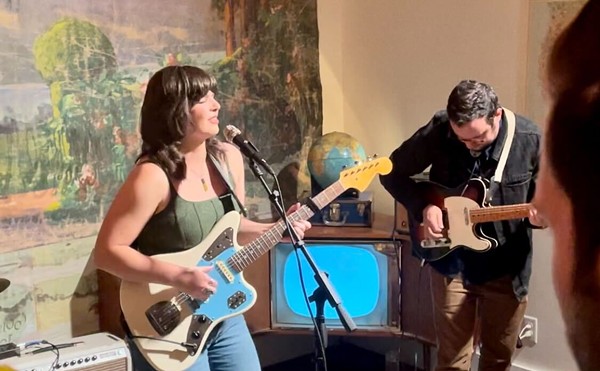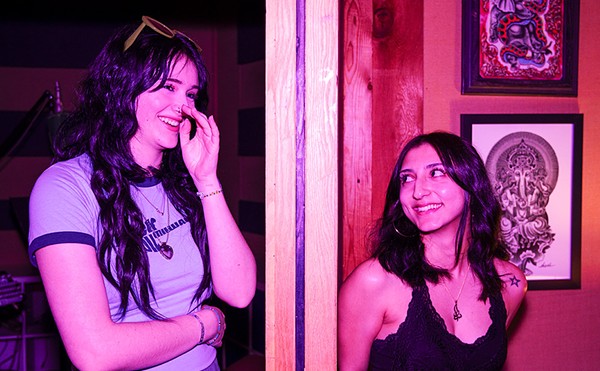So the critics are wrong -- the Anti-Pop Consortium isn't experimental hip-hop. It isn't avant-garde. No calculated study of the group's intentions is required to appreciate "Ping Pong (The Return)," a song from the group's second album that boasts a beat built around the rhythm of a table-tennis match and contains such oblique claims as "My symphonic monopoly philosophy sloppily etches those awkwardly quarter-to-three brass sample to gas lamp." You ain't heard nothin' like this group; it never plays it safe, and it talks about killing hip-hop. But the first thing you realize when you hear the Anti-Pop Consortium is not that it's difficult but that it's dope. The experiment worked -- the Anti-Pop Consortium discovered a new dimension, but it's a dimension within the known rap universe, where all the old rules apply. Beats must cause heads to nod, and rhymes must crackle with wit.
"The thing with Anti-Pop is not that we're against popular music; it's more of a description of what the music isn't," says rapper Beans, who, along with M. Sayyid and High Priest, rhymes on and produces the Anti-Pop Consortium's tracks. "It's not so antagonistic as some people think -- there are some good things that are pop, and we don't want to put ourselves in a cubbyhole. If it was that antagonistic, we wouldn't be able to advance further."
The name, rather, was born almost by accident. High Priest started a label called Anti-Pop out of frustration with the industry. For years, every record company the group approached was unable to see dollar signs in its bleepy, polyrhythmic instrumentals and abstract rhymes, which it had honed in the New York spoken-word scene. His label released a series of tapes called Consortium, and people around the Big Apple began putting the two names together, so when the three decided to form a group, the Anti-Pop Consortium just fell into place.
The group's debut album, Tragic Epilogue, came out on Anti-Pop Recordings but was licensed under the higher-profile imprint 75Ark. Surprisingly enough to the group, after years of shut doors and advice that "no one's going to buy that weird shit," the record moved respectable numbers and garnered much critical praise, especially in Europe. Clearly, audiences numbed by paint-by-numbers, R&B-infused party rap and equally uninspired underground hip-hop heard something new in the Anti-Pop Consortium's dense, jarring productions and challenging wordplay.
The attention overseas resulted in a recording deal with Warp, the envelope-pushing "post-techno" British label that's home to Aphex Twin and Autechre. That association seemed to solidify the Anti-Pop Consortium's futuristic, alternative tagline, to the point where one might wonder how much connection the group feels to the term "hip-hop" at all.
Don't get it twisted, warns Beans. "Hip-hop is still the basis of everything we do," he argues. "We keep abreast of what's going on, always. Some of the songs on [Nas' latest album] Stillmatic are very well written, I love Jay-Z's album, and [Ghostface Killah's] Supreme Clientele is my shit. But I can't listen to one kind of music for too long, so I go back and forth with it and other music a lot."
Arrhythmia, the band's second album, draws on a variety of other music for its inspiration. A flutter of the microclicking sounds -- the rage in minimal techno -- opens the track "Dead in Motion," and "Bubbles" bounces with hand percussion that calls to mind the disco mixes of famous New York DJ Larry Levan. Whereas urban producers such as Timbaland flirt with cutting-edge electronic-music techniques at the same time they deny any direct inspiration from techno, the Anti-Pop Consortium openly admits its debt to dancier sounds.
"I've been a fan of Warp for years, before we signed to the label," Beans says. "We all have very eclectic tastes, and we all like electronic music." High Priest will be taking the influence one step further with a solo album he has in the works, called Anton Tonebar's Sonics for the Youth, a vocal-free beats-and-synths album for Warp.
The Anti-Pop Consortium's shows, like its albums, stray from the rap template. Instead of reheating instrumentals with a DJ or a DAT ("That format didn't challenge us enough and seemed redundant," Beans quips), the three MC/producers play drum machines and keyboards live, keeping their setlists fluid, to allow a degree of improvisation. No samples are used onstage or in the studio: The Consortium insists that tracks built with other people's ideas limit the music's potential.
The Anti-Pop Consortium is content to continue fucking with people's expectations about rap music, all the while adhering to the group's original precepts. "The thing I really desire from this whole project is autonomy," Beans says. "I want to switch up when I feel the need to switch up. We all have different things to say as individuals, and I know I want to get to the point where I can make music that's a bit more extended, that goes beyond three and five minutes, where albums are only, like, four songs long. I want to get more of my compositional side out, more arranging-oriented. Don't sleep, though -- hip-hop will always be where we're coming from."





